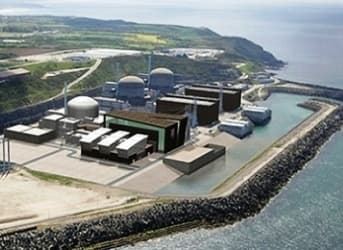The British government recently made a deal with French-owned EDF, Arriva and Chinese investors to continue with the development of the Hinkley Point C nuclear plant in Somerset. This represents a major step in David Cameron’s energy strategy, as energy increasingly becomes a focal point of the next general elections campaign.
On 21 October the UK chancellor George Osborne announced a major deal that will revive plans to give nuclear energy a more relevant role in the UK energy mix. The new power station should become operational by 2023, with a cost of £16 billion and a guaranteed unit price of £92.50 per megawatt-hour of produced energy – twice the current energy price. This is the latest attempt by the UK government to establish a credible long-term energy policy, and thus create a favourable investment climate in the energy sector.
It seems that the decision to unfreeze the long-standing Hinkley project is the effect of the realisation that nuclear power might be the optimal way to secure energy in the mid to long-term and cut the carbon footprint by 80 percent by 2050. On the other hand, the decision might have come as the Coalition’s response to Ed Milliband’s strong attack on the government’s inability to control the energy market in the UK.
Related article: Energy Starved Jordan to go Nuclear
The deal with French company EDF, Arriva and their Chinese partners is a direct response to the Labour intention to interfere with free market laws. Another message that the Coalition is trying to transmit to the public is that the era of cheap energy is long gone, and that the current priority should be to secure sustainable and clean sources of energy at the most affordable market price. Indeed, nuclear energy is not cheap, but it has its advantages over other energy sources: It is carbon free, relatively safe, and although nuclear is comparable with renewables in terms of subsidies, high capital costs and price per MWh of produced energy, it is much more reliable in terms of energy production and distribution.
According to the UK government, building new nuclear power stations might actually cut energy bills by 2030. Nuclear energy is also more acceptable to the public, in comparison to the extremely unpopular attempts to promote shale gas developments in the UK. However, the deal is criticized as unfavourable for both the government and consumers. The key argument behind this criticism is the fact that the government could have taken advantage of cheap shale gas that will soon become available from the U.S., or increase efforts to reduce consumption, instead of making a 35 year deal on the assumption that the energy prices will inevitably go up.
Related article: Japanese Political Elite Divided over Country’s Nuclear Future
The recent deal is also in stark contrast with the developments in other European countries. Following the Fukushima disaster, many European countries, such as Germany, Italy and Switzerland, have decided to abandon nuclear energy completely , or – like France – reduce their dependence on it. The UK example, should it work, might give the battered nuclear sector a new chance in Europe. At the same time, the move is a huge gamble for the UK’s ruling coalition that exposes it to the attacks from both the opposition and voters, who are already irritated by the ever-rising cost of energy.
ADVERTISEMENT
By Ante Batovic

















